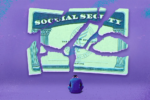In today’s digital age, your Social Security number (SSN) is one of the most sensitive pieces of personal information you possess. While it’s essential for government identification and financial transactions, sharing your SSN recklessly can expose you to identity theft and financial fraud. This article explores when it’s safe to share your SSN, the risks involved, and tips for protecting it.
Why Your Social Security Number Is Important
Your SSN is a unique identifier issued by the U.S. government, primarily for tracking Social Security benefits. Over time, it has become a key component in various sectors, including banking, healthcare, and employment. Unfortunately, its widespread use also makes it a prime target for cybercriminals.
When someone gets hold of your SSN, they can open credit accounts, take out loans, or even commit tax fraud in your name. This can lead to significant financial and emotional distress, as resolving identity theft often takes months or even years.
When Is It Safe to Share Your SSN?
Although you should guard your SSN closely, there are instances where sharing it is necessary and safe:
- Government Agencies: Agencies like the IRS, the Social Security Administration, or your state’s DMV may require your SSN.
- Financial Institutions: Banks and credit unions need your SSN to verify your identity and comply with federal regulations.
- Employment: Employers must collect your SSN for tax reporting purposes.
If you’re ever asked for your SSN, ensure you’re dealing with a legitimate organization. Ask why it’s needed, how it will be used, and what measures are in place to protect your data.
Risks of Sharing Your Social Security Number
Sharing your SSN without caution can lead to several risks, including:
- Identity Theft: Criminals can use your SSN to impersonate you, access your accounts, or open fraudulent lines of credit.
- Tax Fraud: Scammers may file fake tax returns using your SSN to claim refunds.
- Medical Identity Theft: Your SSN can be used to access healthcare services under your name, potentially affecting your medical records.
- Employment Fraud: Someone could use your SSN to secure a job, leaving you responsible for unpaid taxes on income you didn’t earn.
How to Protect Your Social Security Number
- Limit Sharing: Only provide your SSN when absolutely necessary. For example, many retailers or landlords request it unnecessarily. Politely ask for alternative forms of identification.
- Secure Physical Documents: Keep your Social Security card in a safe place and avoid carrying it in your wallet.
- Monitor Financial Activity: Regularly check your credit reports and bank statements for suspicious activity. You’re entitled to a free annual credit report from each of the three major credit bureaus (Equifax, Experian, and TransUnion) at AnnualCreditReport.com.
- Freeze Your Credit: If you suspect your SSN has been compromised, placing a credit freeze can prevent new accounts from being opened in your name.
- Beware of Scams: Be cautious of phone calls, emails, or texts claiming to be from the IRS or Social Security Administration. These agencies will never ask for your SSN over the phone or via email.
What to Do if Your SSN Is Stolen
If you suspect your Social Security number has been stolen, take these steps immediately:
- Report the Theft: Contact the Federal Trade Commission (FTC) at IdentityTheft.gov to file a report.
- Alert Credit Bureaus: Notify Equifax, Experian, and TransUnion to place a fraud alert or credit freeze on your account.
- Contact the SSA: Reach out to the Social Security Administration to monitor for misuse of your benefits.
- File a Police Report: If identity theft occurs, a police report can help with disputing fraudulent charges.
Common Myths About Sharing Your SSN
- Myth: It’s safe to share your SSN with anyone who asks for it.
Reality: Many organizations request SSNs unnecessarily. Always verify if it’s truly needed. - Myth: Your SSN is private as long as you don’t share it online.
Reality: Physical documents containing your SSN can also be stolen, so they must be stored securely. - Myth: Identity theft only happens to people who are careless.
Reality: Even the most vigilant individuals can fall victim to sophisticated scams.
Balancing Caution and Necessity
While protecting your SSN is crucial, there are legitimate scenarios where sharing it is unavoidable. The key is to be cautious, ask questions, and stay informed about how your information is being used.
By taking proactive steps to safeguard your Social Security number, you can reduce the risk of identity theft and enjoy greater peace of mind in an increasingly digital world.
For more tips on protecting your personal information, visit the Federal Trade Commission’s website at FTC.gov.
Disclaimer – Our team has carefully fact-checked this article to make sure it’s accurate and free from any misinformation. We’re dedicated to keeping our content honest and reliable for our readers.








